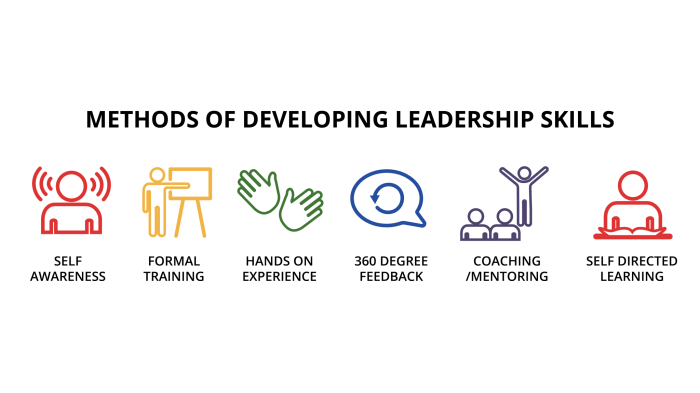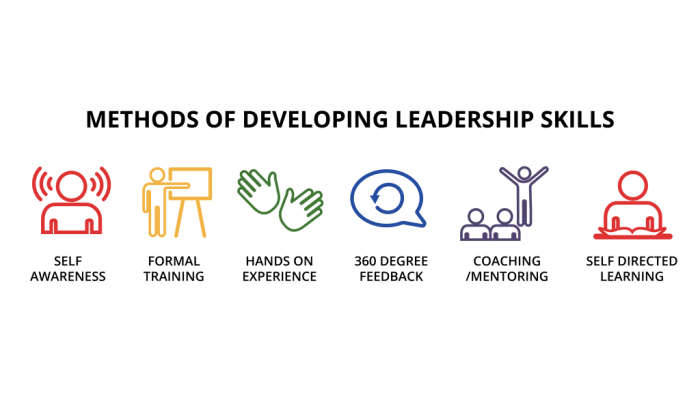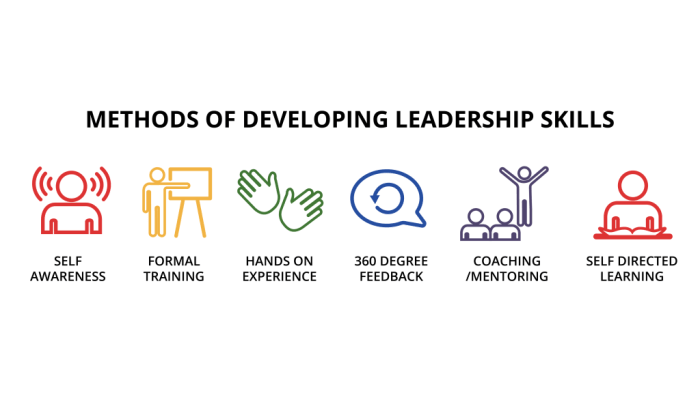Kicking off with Developing Leadership Skills, this opening paragraph is designed to captivate and engage the readers, setting the tone american high school hip style that unfolds with each word.
Leadership skills are crucial in today’s fast-paced world, where the ability to lead and inspire others can make a significant impact. Whether you’re looking to advance in your career or make a difference in your community, honing your leadership skills is key to success.
Understanding Leadership Skills
Leadership skills refer to the abilities and qualities that enable an individual to guide, motivate, and inspire a group of people towards a common goal. Effective leaders possess a unique set of characteristics that help them navigate challenges, communicate effectively, and make sound decisions.
Key Characteristics of Effective Leaders, Developing Leadership Skills
- Strong Communication Skills: Effective leaders are able to articulate their vision clearly and motivate others through their words.
- Empathy: Good leaders understand the emotions and perspectives of those they lead, creating a supportive and inclusive environment.
- Adaptability: Leaders must be able to adjust their strategies in response to changing circumstances and new information.
- Integrity: Trust is essential in leadership, and integrity is key to maintaining that trust with team members.
- Problem-Solving Skills: Leaders must be able to analyze complex situations and make decisions that benefit the team as a whole.
The Importance of Developing Leadership Skills
- Effective leadership can drive innovation and productivity within a team or organization.
- Developing leadership skills can open up opportunities for career advancement and personal growth.
- Strong leaders can inspire and motivate others, creating a positive work culture and boosting morale.
- Leadership skills are essential for managing conflicts, making tough decisions, and guiding a team through challenges.
Developing Leadership Skills in the Workplace

Leadership skills are crucial in the workplace as they help guide teams, inspire collaboration, and drive productivity. Employees with strong leadership skills can effectively communicate, make decisions, and motivate their colleagues towards achieving common goals.
Positive Impact on Team Dynamics
- Improved Communication: Leaders with strong communication skills can ensure that information flows seamlessly within the team, leading to better understanding and coordination.
- Enhanced Collaboration: Effective leaders promote a culture of teamwork and encourage employees to work together towards a shared vision, fostering creativity and innovation.
- Increased Morale: When employees feel supported and empowered by their leaders, morale is boosted, leading to higher job satisfaction and lower turnover rates.
Strategies for Cultivating Leadership Skills
- Provide Training and Development Opportunities: Offer workshops, seminars, and mentoring programs to help employees enhance their leadership abilities and learn new techniques.
- Encourage Feedback and Reflection: Create a culture where employees receive constructive feedback on their leadership style and are encouraged to reflect on their strengths and areas for improvement.
- Lead by Example: Demonstrate the qualities of a good leader through your actions, decisions, and interactions with others, serving as a role model for aspiring leaders within the organization.
Leadership Skill Training Programs: Developing Leadership Skills
Leadership skill training programs are essential for individuals looking to enhance their leadership abilities and advance in their careers. These programs provide valuable insights, tools, and techniques to help individuals become effective leaders in various settings.
Types of Leadership Skill Training Programs
- On-Site Workshops: These programs are conducted in a physical location, allowing participants to interact with instructors and peers in person. They often include hands-on activities and group discussions.
- Online Courses: Online leadership training programs offer flexibility and convenience, allowing participants to access materials and complete assignments at their own pace. These programs are ideal for individuals with busy schedules or those who prefer self-paced learning.
- Executive Coaching: This type of program involves one-on-one sessions with a professional coach who provides personalized guidance and feedback to help individuals develop their leadership skills.
In-Person vs. Online Leadership Training Programs
While in-person workshops offer the benefit of face-to-face interaction and immediate feedback, online courses provide flexibility and accessibility. In-person programs may be more engaging and conducive to networking, while online courses allow for self-directed learning and the ability to revisit materials as needed.
Success Stories of Leadership Skill Training
“After completing an online leadership course, I was able to apply new strategies and communication techniques in my workplace, leading to improved team performance and increased productivity.” – Jane Doe
“Attending an executive coaching program helped me gain confidence in my decision-making abilities and enhance my leadership presence, ultimately leading to a promotion within my organization.” – John Smith
Practical Exercises for Developing Leadership Skills

In order to enhance leadership abilities, individuals can engage in a variety of practical exercises that focus on key aspects of leadership. These exercises help in building confidence, improving communication, decision-making, and teamwork skills, which are essential for effective leadership.
Exercise 1: Communication Skills Workshop
Communication is a crucial skill for any leader. Conduct a workshop where participants can practice active listening, giving feedback, and delivering clear messages. Encourage role-playing scenarios to simulate real-life communication challenges.
Exercise 2: Team Building Activities
Team building exercises are great for developing leadership skills in the workplace. Organize activities such as problem-solving challenges, trust-building exercises, and group projects. This helps in fostering collaboration, delegation, and conflict resolution skills.
Exercise 3: Decision-Making Simulation
Simulate decision-making scenarios where individuals have to make tough choices under pressure. This exercise helps in improving critical thinking, problem-solving, and strategic planning skills. Encourage participants to analyze the outcomes of their decisions and learn from them.
Exercise 4: Mentoring and Coaching
Pair up individuals for mentoring and coaching sessions to provide guidance and feedback on their leadership development journey. This personalized approach helps in identifying strengths and areas for improvement, while also fostering a supportive learning environment.
